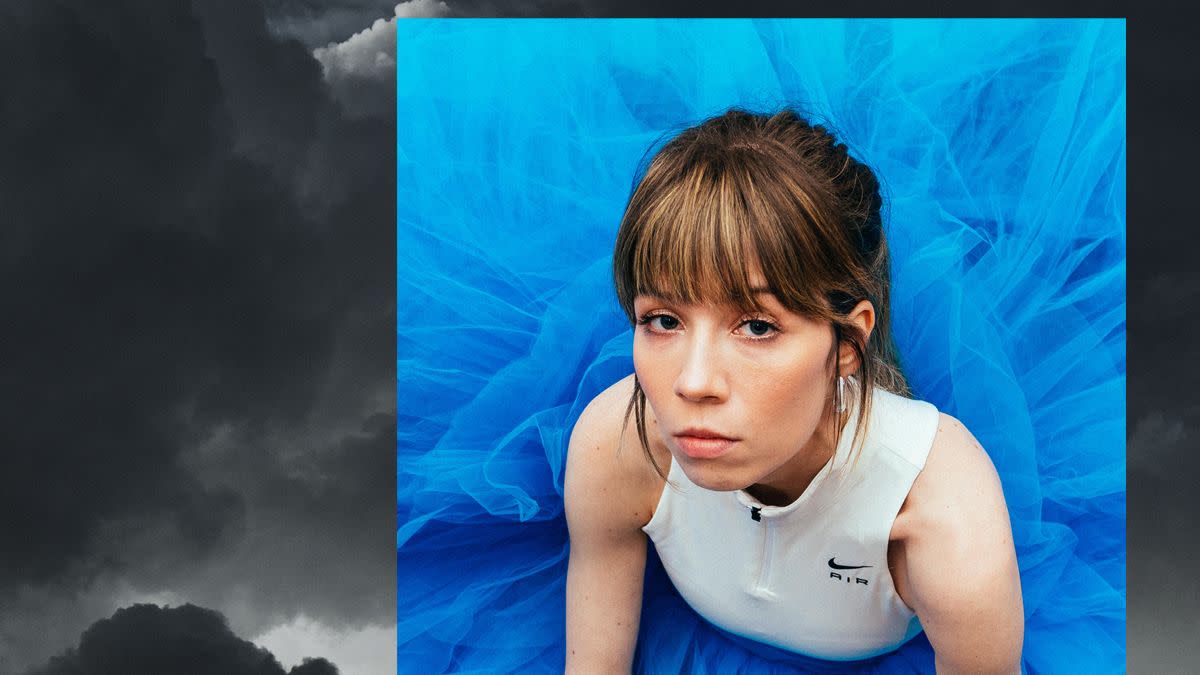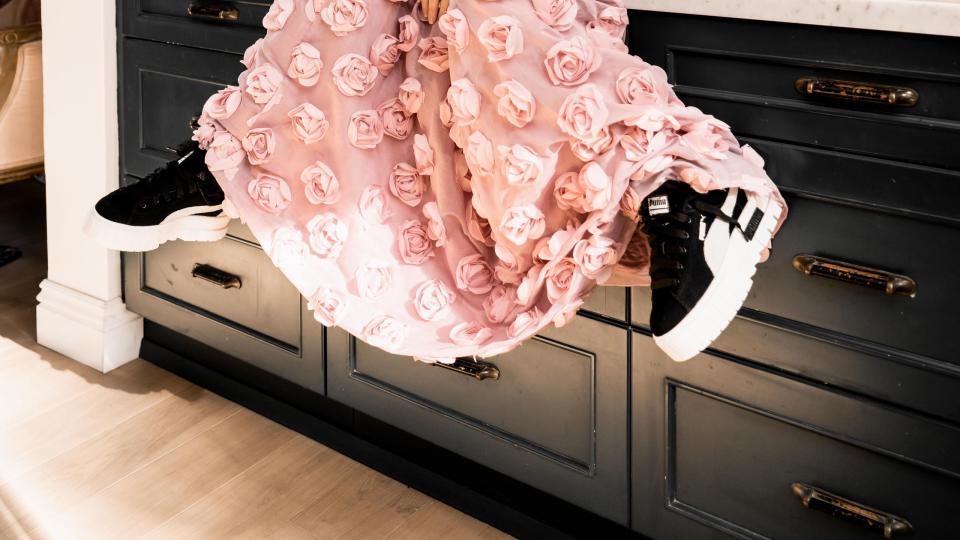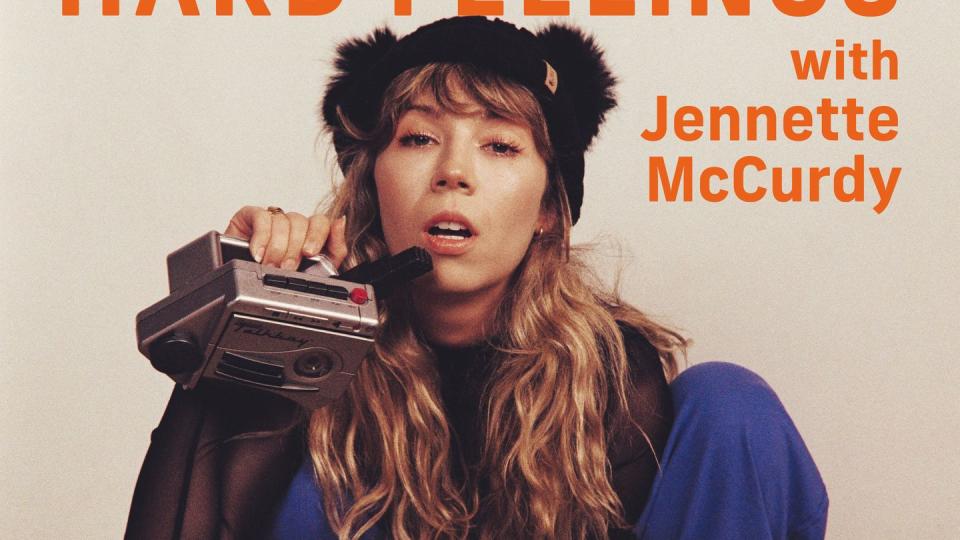Jennette McCurdy Wants You To Feel Your Feelings

Early in her therapy journey, Jennette McCurdy found herself filling out a worksheet titled “How Do You Feel About Your Feelings?” It turns out the answer was complicated.
“I was shocked,” she remembers, “because I had so much judgment around my feelings that I wouldn’t have even realized was there. I had a lot of the frankly misogynistic judgements around being a woman with emotions: ‘I don’t want to be dramatic. I don’t want to be over-emotional. I don’t want to be sensitive.’”
Feelings remain a point of fascination for McCurdy, whose memoir I’m Glad My Mom Died became a bestseller when it came out last year, tapping into deep veins of grief and trauma and dissecting her past as a child star. McCurdy has said she enjoys the control writing gives her, so her new project is a bit of a curveball: an off-the-cuff-feeling podcast, Hard Feelings With Jennette McCurdy, in which she talks about whatever she happens to be feeling around the time of recording (past episode titles include shame, pressure, and bad mood—all uncapitalized, like Olivia Rodrigo songs.) The style is lo-fi, with McCurdy’s slamming hotel room door or a background siren cropping up in the audio. Each micro-episode feels as intimate as morning breath—like getting a voice memo from a friend, captured at that precise point between feeling something and analyzing it. In fact, the concept grew out of McCurdy’s longtime habit of recording voice memos for herself when she was in the throes of a particular emotion.
In the episodes, McCurdy will often describe the way her emotions physically make her feel: ears burning, body clenching or twitching, eyes about to fill with tears. At one point, she says, she was so divorced from that mind-body axis that “I wouldn’t know whether I was crying because I was sad, devastated, angry, jealous. I was having physical reactions, but I did not know how to label emotions. It’s really useful to talk through some of those physical sensations: ‘My mouth is twitching here, or I’m feeling tingly, or my eyebrows are furrowing.’”
Hard Feelings is the newest original project from Lemonada Media, which has also produced podcasts for Samantha Bee and Julia Louis-Dreyfus. And even in a saturated market, it is clearly resonating, hitting #1 on the Apple charts. McCurdy wasn’t sure at first if she could pull it off; the improvisatory nature made it feel like a tightrope walk. “Initially, it was terrifying,” she recalls. “I was like, ‘Oh my God, I’m free-falling here.’ But I found it to be a very useful process for [developing] ideas.” Since she filled out that fateful worksheet, “I’ve been on a mission to more thoroughly process my emotions, appreciate my emotionality, learn from my emotionality, and accept that my emotions are very useful information. It doesn’t mean they need to be in the driver’s seat of my life, but they definitely need a seat in the car.”

And despite our much-ballyhooed newfound openness about mental health, “I don’t think we talk enough about processing difficult, uncomfortable emotions. Authenticity is rewarded these days, but a very narrow view of authenticity, which is just likable authenticity,” she says. “I wanted to try to make episodes where I’m showing ugly and insecure shades of myself.” That meant re-recording the episode that became “bad mood,” which she originally approached as “the tips and tricks I use to get out of my bad fuckin’ mood!” as she says in a faux-hearty voice on the final version. Rather than share mental health hacks or try to channel gratitude, she decided to simply embrace the fact that she was having a bad day and record from there. “There are no shortcuts to mental health,” she tells me, reflecting on that episode. “There are really useful tools and strategies, in my experience, but there’s no fast lane.”
The Platonic image of mental-health discourse today is still likely to be a tearful girl in no-makeup makeup getting “real,” or a pretty influencer calling herself unwell. Yes, we’re permitted to appear more vulnerable than we once were, but the picture is still far from unvarnished. And all our awareness doesn’t necessarily translate into action. “It reminds me of when there are walks to raise awareness and I’m like, ‘Okay, the awareness is raised. What about doing something about it?’” McCurdy says. “I feel like that’s where we are with the mental health discussion. It can’t hurt that it’s become so popularized and so commonplace. But there’s a lot more work to do, and a lot of the conversation around it, frankly, is very surface-level. I think it’s a lot more muddy and gray-area than it’s often viewed as.”
Hard Feelings isn’t afraid to live in the gray area. In “shame,” McCurdy talks about feeling ashamed when an attendee at a book event shouted out a catchphrase from her Sam & Cat character, realizing that she still felt an intense sense of shame about long-past projects, and accepting that even telling her story in a wildly successful memoir would not necessarily help her outrun those feelings. In “pressure,” she talks about how feeling like an underdog once motivated her and confesses, “I want to know what life would look like if I didn’t feel this constant, gnawing need to prove myself.” And in “egg freezing,” she talks about looking into, well, freezing her eggs—despite her ambivalence about one day having children.

The episodes often circle back to confronting, and grappling with, her past. When I ask if acting helped her to be more in touch with her feelings, she immediately replies, “Less. A thousand times less...I was literally paid to feel things on command, yet could not have told you what I was feeling. I knew how to emulate a feeling for directors or casting directors or on set, but I could not have been less in touch with my own feelings.” She adds, “I hear the irony.”
Now that McCurdy is truly feeling her feelings, she is learning to appreciate them. “I think I’d be living a very sterile, boring, uninspired life, frankly, without my emotions,” she says. Since the podcast is dictated by what she happens to feel in the moment, it’s hard for her to tease future episodes. But there are a few she hopes to tap into over the run of the show. “Rage is a big one that I can't wait to explore. But I’m also scared. So maybe also fear.” Whatever comes next, her listeners will be feeling it along with her.
You Might Also Like

